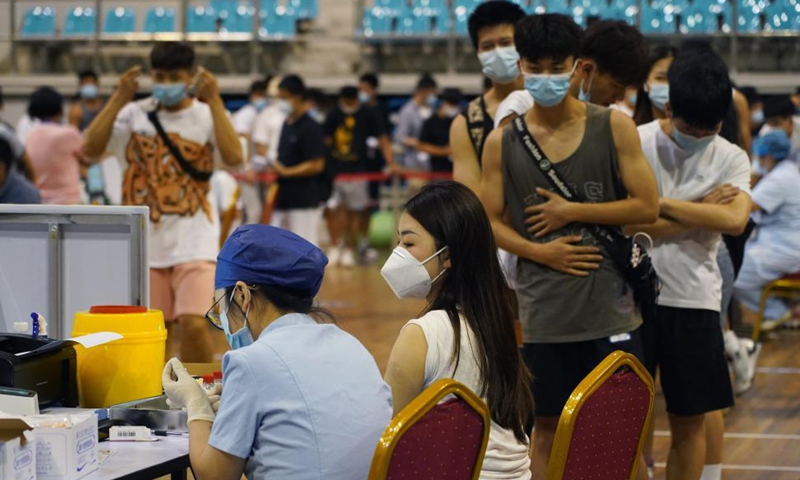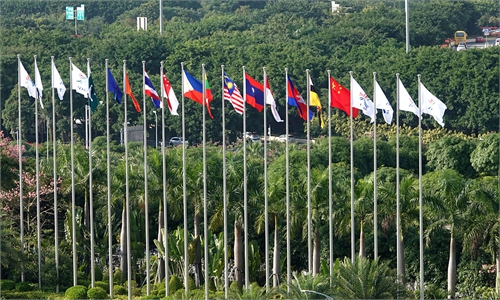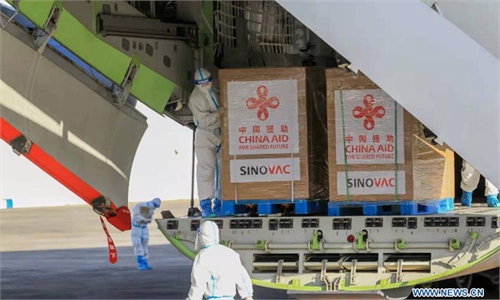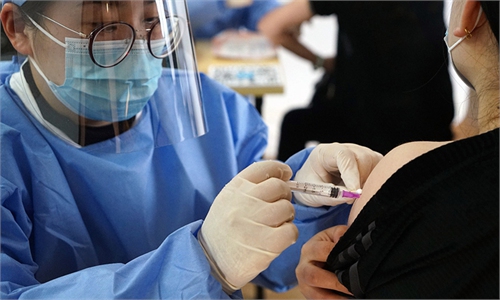China approves COVID-19 vaccines for children above 3 years old
Step-by-step vaccination plan to be adopted out of safety, capacity concerns: expert

Medical workers administer COVID-19 vaccines to college students in Nanchang, capital of east China's Jiangxi Province, June 4, 2021. A temporary vaccination site is newly set at a stadium, with daily inoculation capacity of about 5,000. Photo: Xinhua
China has begun to allow those aged between three and 17 years old to get shots of COVID-19 vaccines, making it the first country to approve these vaccines for such a young age group. Chinese observers said the country will follow the plan step-by-step out of safety concerns and based on production capacity.
An official from the vaccine research and development group led by the State Council, the cabinet, confirmed with China Central Television (CCTV) on Sunday that China has approved the emergency use of COVID-19 vaccines for those aged between three and 17 years. CCTV did not reveal the official's name.
The official said that experts have confirmed the safety and efficacy of giving COVID-19 vaccines to that age group. After relevant approval, the vaccination will start for the age group as the country shifts from vaccinating older people to younger ones.
On the same day, Zeng Yixin, deputy director of the National Health Commission (NHC), confirmed in an interview with the Xinhua News Agency that China aims to give COVID-19 shots to at least 70 percent of its population by year-end.
Chinese vaccine experts reached by the Global Times on Monday said vaccinating children above three years old is key for the country to reach herd immunity. But to address safety concerns, the country will cautiously use the vaccines among this age group, by distinguishing them into different groups by age or by initially vaccinating minors living in regions more susceptible to the virus, such as Guangzhou.
Apart from some concerns about giving vaccines to minors, restrictions for the large-scale vaccination of children mainly come from the tight supply of COVID-19 vaccines in China, which are being pressured by increasing domestic and foreign demand, as well as the possible mass adoption of booster shots, experts said.
The approval fits the world trend of lowering the vaccination age to teenagers, and it makes China the first country in the world to give COVID-19 shots to children as young as three years old, an immunologist based in Beijing told the Global Times on condition of anonymity on Monday.
China authorized the emergency use of CoronaVac, the COVID-19 vaccine manufactured by Chinese firm Sinovac, for children aged between three and 17, Sinovac Chairman Yin Weidong told the media on Friday.
Feng Duojia, president of the China Vaccine Industry Association, told the Global Times on Monday that approval for Sinopharm's vaccine is also on the way.
Following China, Thailand is considering whether to lower the age for Sinovac vaccines to three years old. The Southeast Asian country launched a mass vaccination plan on Monday.
Canada was the first country to approve vaccines for children aged 12 and above on May 5. Since then, countries including the US, the UK and Singapore approved the Pfizer/BioNTech coronavirus vaccine for use in children aged 12 to 15, after a review of safety and effectiveness, reports said.
Besides Pfizer/BioNTech, Moderna is also actively studying the use of the vaccine in younger children. Young children, even toddlers, could also be eligible by the end of the year, Anthony Fauci, the top infectious disease expert in the US, was quoted as saying by US media.
"Children aged three to 17 are part of the target group of the national vaccination plan, and a key group for the country to reach herd immunity. I believe children should receive doses the same as adults, as no solid evidence demonstrates the risk for children is any higher than for adults," Tao Lina, a vaccine expert based in Shanghai, told the Global Times on Monday.
The use of COVID-19 vaccines on children remains controversial since there has yet to be any open and solid data in clinical trials on children. Some questions also linger, such as whether it is necessary to make children take the risk, as some argue this age group is not susceptible to COVID-19 to the same degree as adults.
An immunologist based in Beijing told the Global Times that the possible risks to children cannot be denied, but they are still a key group for the country to reach herd immunity. Thus, to ease public concerns, China is expected to roll out the program among children step-by-step, either distinguishing them by ages or by grades, or by giving relatively smaller doses of vaccines designated for children.
"As China starts vaccination among children, vaccines and the vaccination plan can always be optimized and adjusted, to fix emerging problems, including security concerns," he said.
The immunologist said China is more likely to start giving shots for the young when Sinopharm also gets the go-ahead for child recipients by authorities, because the priority for the current phase is to further expand inoculations among adults, due to tight vaccine production capacity.
Feng said that China will gradually prompt vaccinations of children, but not all at once, because there is huge demand from both overseas and domestic, as well as preparations for a booster shot.
"China's total vaccine production basically meets the daily administered doses across the nation, about 20 million doses. In some places, vaccines are immediately out of stock on the same day of distribution," Feng said.
China had administered 777 million doses of COVID-19 vaccines as of Sunday, according to the NHC.




